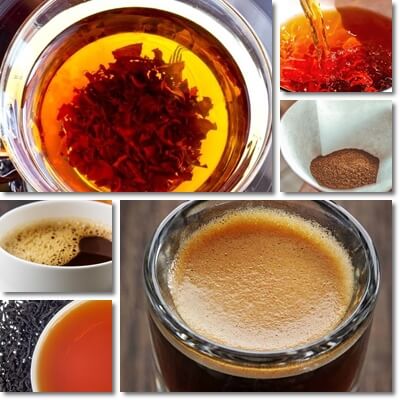What are the benefits of drinking coffee with tea? If you like to drink your coffee with tea, then there are quite a few benefits for you to enjoy.
Teas that pair well with coffee are black tea, and also herbal teas that work well as coffee substitutes such as dandelion root or chicory root.
Benefits for health may vary depending on the variety of tea you like to pair your coffee with and individual coffee drinking habits.
What are the benefits of coffee with tea?
1) Increased alertness and productivity
A cup of coffee with black tea is the perfect way to start your morning to get you excited for the day ahead and boost your productivity. If you drink your coffee with a tea such as black tea, then you will still be getting a hefty dose of caffeine as black tea is a natural source of caffeine. Caffeine is a stimulant of the nervous system. It increases alertness, boosting physical and mental responsiveness and improving reaction time.
Moreover, caffeine intake from coffee with black tea improves mental performance which boosts productivity, as well as boosts mood with further benefits for productivity.

2) High energy levels
Even if you cut down on your intake of actual coffee by drinking part coffee and part black tea which go very well together, you’ll still enjoy elevated energy levels to keep you alert and productive for hours. This is because black tea has caffeine with stimulating effects on the nervous and cardiovascular systems and combats sleepiness, lethargy and tiredness.
3) Helps you cut down on your caffeine intake
Although some of us absolutely love coffee as it is, sometimes we have to cut down on our intake of caffeine, whether for medical reasons or simply because we’re having too much of it and that’s not ok. If you don’t love decaffeinated coffee, then you have the option of watering down your morning coffee with a caffeine-free herbal tea such as dandelion root or chicory root in order to cut down on your caffeine intake.
Why dandelion root and chicory root tea? Both dandelion and chicory root tea are great coffee substitutes, closely resembling coffee in appearance and taste without actually providing any caffeine. In addition to being caffeine free, the two coffee substitutes provide a host of benefits for health such as hepatoprotective effects and an antidiabetic action.
4) Fewer palpitations and extrasystoles
Palpitations and extrasystoles are common cardiovascular manifestations known to be both caused and amplified by caffeine consumption. Switching to decaf coffee, reducing your everyday intake of coffee, or the frequency of consumption can help significantly improve your palpitations and extrasystoles.
If your experience with palpitations and extrasystoles can be resolved by simply reducing your intake of caffeine, another solution is to water down your coffee with a caffeine free herbal tea which can be any plant tea except for green, white and black tea which contain caffeine naturally.
Even better, add milk to your morning brew to both reduce your intake of coffee and caffeine, and boost your cardiovascular health. Choose a low fat dairy milk – the lower fat content allows for a higher content of magnesium and potassium in milk for cardiovascular support.

5) Good for high blood pressure
Caffeine in coffee is a stimulant of the cardiovascular system that drives heart rate and blood pressure numbers up. The cardio-stimulating effects are dose-dependent so even if you just cut down on your coffee intake you should see improvements in your blood pressure.
If going decaf or coffee-free is not an option for you, a good solution is to water down your morning coffee. Do so with a non-caffeinated herbal tea that also works as a coffee substitute, such as dandelion root or chicory root, or even a grain-based coffee substitute that can be infused just like coffee and tea. Even better, add a low-fat or non-fat dairy milk to get potassium and magnesium with important blood pressure lowering effects.
At the same time, research suggests black tea lowers blood pressure despite being a source of caffeine.
More exactly, it appears that ‘regular consumption of black tea can reduce blood pressure’, ‘although the effect is small’ (source 1, source 2).
All of these tips work if you have only slightly higher than normal blood pressure numbers and can still drink coffee safely, albeit in smaller amounts. But if your blood pressure is simply too high, then regular coffee is not a good option for you. Instead, you should consider decaf coffee or a coffee substitute such as dandelion root coffee, chicory root coffee, barley coffee or rye coffee.
6) Good for low blood pressure
Coffee itself is an excellent remedy for low blood pressure as it is rich in caffeine which exerts a stimulating action on the cardiovascular system, raising blood pressure numbers.
You can enjoy the same effect if you drink coffee with tea such as coffee with black tea, green or white tea. Teas made from the tea plant, Camelia sinensis, naturally have caffeine which helps raise abnormally low blood pressure numbers.
7) A boost in antioxidant intake
One of the benefits of drinking coffee with tea is that you get a mix of different antioxidants in your diet and a boost in total antioxidant intake.
Both coffee and tea are naturally high in antioxidants. Not just this, but antioxidants in coffee and tea are also highly biologically active meaning they actively contribute to good health.
Whether you choose caffeinated teas such as black tea to drink with your coffee, or herbal teas such as chicory root or dandelion root, you will get a range of antioxidants with free radical scavenging properties, anti-inflammatory effects and anticancer action.
Theaflavins and thearubigins, catechins and other major constituents of black tea have both antioxidant activities and anticancer properties.
Antioxidant constituents in herbal teas such as chicory root and dandelion root also provide anti-inflammatory benefits and exert hepatoprotective effects, antidiabetic and anticancer activities.
8) Antidiabetic benefits
Did you know that both coffee and herbal teas have an antidiabetic action? More exactly, biologically active constituents in the plant preparations exert antihyperglycemic and antidyslipidemic effects, helping lower blood sugar levels and normalize blood lipid profiles.
Moreover, biologically active constituents in coffee and tea have been found to improve the level of adiponectin which is a protein hormone involved in regulating glucose levels and fatty acid breakdown and oxidation. Improving levels is believed to help improve insulin control, blood glucose and triglyceride levels, exerting a well-rounded antidiabetic action.
Dandelion root tea has syringin, a compound with known antidiabetic effects. Both dandelion and chicory root contain inulin with benefits for metabolism and blood sugar control. Coffee has caffeine and chlorogenic acid with antidiabetic effects while black tea has caffeine, catechins, theaflavins and thearubigins.
9) Added hepatoprotective benefits for the liver
Coffee is rich in antioxidants with systemic effects, including benefits for liver protection. Studies show that ‘consumption of coffee has been shown to benefit health in general, and liver health in particular’.
More exactly, ‘coffee consumption is associated with improvement in liver enzymes (ALT, AST, and GGTP), especially in individuals with risk for liver disease’.
Not just this, but there is also ‘clinical evidence of benefit of coffee consumption in Hepatitis B and C, as well as nonalcoholic fatty liver disease and alcoholic liver disease’. ‘Coffee intake more than 2 cups per day in patients with preexisting liver disease has been shown to be associated with lower incidence of fibrosis and cirrhosis, lower hepatocellular carcinoma rates, as well as decreased mortality’ (source).
Adding black tea, green tea or herbal teas to coffee can further boost liver health. According to research, both black tea and green tea demonstrate antitumor effects against liver cancer, inhibiting migration and invasion of liver cancer cells (source).
Inulin in chicory and dandelion root used to make chicory and dandelion tea and coffee has been shown to induce ‘increased expression of proteins involved in hepatocyte protection against oxidative stress’ (source), essentially exerting an antioxidant effect and protecting liver cells from oxidative stress damage.
Also, the byproducts of the prebiotic fermentation of inulin, which are short-chain fatty acids, ‘may also influence the expression of genes encoding liver enzymes’. Other bioactive compounds in the herbal teas, such as sesquiterpene lactones, further contribute with benefits for liver health.
10) Benefits for constipation and slow transit
It’s not just coffee that relieves constipation with amazing effectiveness, but herbal teas too. Black tea, which is an excellent pair for coffee, complimenting its aroma and enriching its flavor profile, is also a significant source of caffeine and is actively involved in improving a slow transit for more regular and easy bowel movements.
Compared to coffee, black tea, green tea and white tea which relieve constipation via their content of caffeine, other herbal teas improve transit via different bioactive components. For example, dandelion root tea, while caffeine free, has inulin and mucilage which help loosen stools and actively regulate transit time without the irritating effect of caffeine.
By absorbing water in the gastrointestinal tract, inulin bulks up stools, and also helps soften them, promoting more easy and regular bowel movements and better bowel function. But while caffeine is irritating on the GI tract, inulin causes gas (flatulence), painful abdominal cramps, loose stools, diarrhea, bloating, excessive burping, and IBS to flare up.
11) Prebiotic benefits
One of the benefits of drinking coffee with tea is getting to enjoy prebiotic benefits for good gut health.
More specifically, herbal teas such as dandelion root or chicory root are sources of dietary fibers that ferment, serving as food for good gut bacteria.
Healthy populations of good gut bacteria both suppress disease-causing ones, and maintain a healthy and balanced gut environment that is conducive to good physical and mental health.
For example, a healthy gut environment support good immune system function and may even help lower depression risks.
You can also drink coffee options such as roasted grains which are popular coffee substitutes – while not actual teas, these are infused just like tea and coffee, and pair well with coffee flavor-wise.
